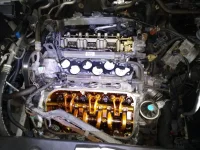It like this - I have a vehicle which I really like - Leather, sunroof, heated seates, navigation screen, DVD screen in middle row for the kids, handles very nimbly for a van (kind of like a sports car LOL), is really fun to drive, etc. Its an older model, but I really like it.
Just spend some money fixing the sliding doors. Just want to keep it another 10 years. Its a 2006.
Some people think I'm crazy, but I really like the vehicle. I watched a youtube video about how the transmission filter is easily changeable but usually no one ever changes it, and it disintegrates over time which goes into your transmission which is really bad. So I ordered the transmission filter from Honda for $28, and will have it installed. You just remove the battery and the air filter housing, and then it's easy to change.
Things like that are worth the money in my opinion. I get all my genuine Honda parts wholesale from internet, and have a good mechanic who doeesn't mind that I bring my own parts. Better in my opinion than letting some other mechanic buy cheap aftermarket parts and mark them up 100% on the invoice. If I get 1 bad caliper, I replace both, as when brake caliper fails, it fries the rotors and pads. I buy the new parts (not the remanufactured). Had a bad experience with a remanufactored brake caliper that only lasted 2 years. I change the air filter annually. As you say, it's good to maintain all aspects of the car.
Just spend some money fixing the sliding doors. Just want to keep it another 10 years. Its a 2006.
Some people think I'm crazy, but I really like the vehicle. I watched a youtube video about how the transmission filter is easily changeable but usually no one ever changes it, and it disintegrates over time which goes into your transmission which is really bad. So I ordered the transmission filter from Honda for $28, and will have it installed. You just remove the battery and the air filter housing, and then it's easy to change.
Things like that are worth the money in my opinion. I get all my genuine Honda parts wholesale from internet, and have a good mechanic who doeesn't mind that I bring my own parts. Better in my opinion than letting some other mechanic buy cheap aftermarket parts and mark them up 100% on the invoice. If I get 1 bad caliper, I replace both, as when brake caliper fails, it fries the rotors and pads. I buy the new parts (not the remanufactured). Had a bad experience with a remanufactored brake caliper that only lasted 2 years. I change the air filter annually. As you say, it's good to maintain all aspects of the car.


